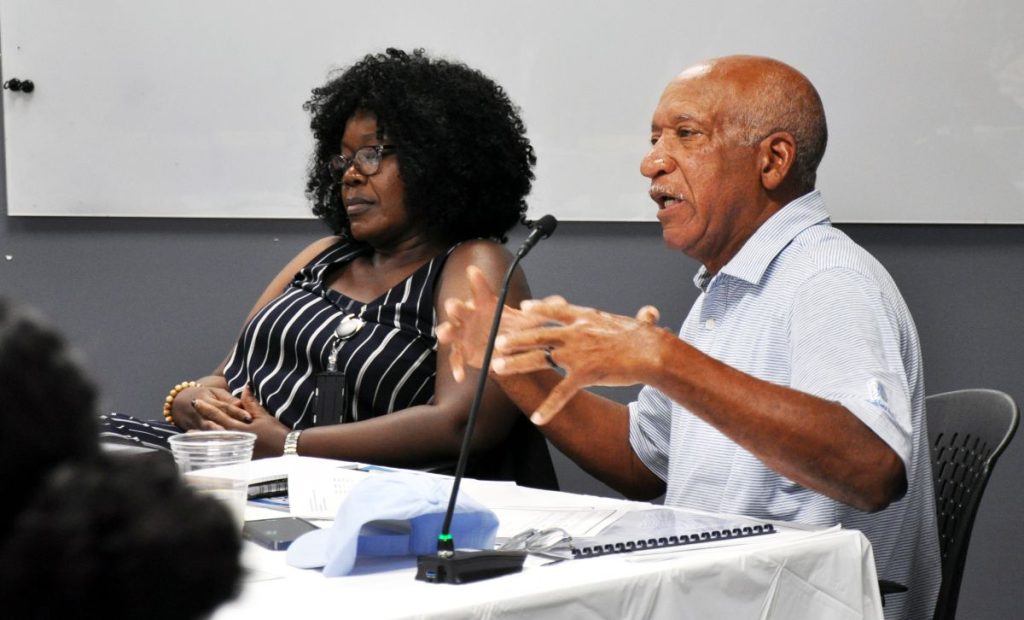Government
Water Works Board Debates Payments to Nonprofit That Helped Local Businesses Bid on Contracts

Donate today to help Birmingham stay informed.
Birmingham’s regional water works board voted Monday to partially pay invoices submitted by a nonprofit that assisted local businesses, particularly those owned by women and minorities, in qualifying to bid on water works’ contracts.
After the board discussed, during a pre-meeting work session, not immediately paying the full amounts the Birmingham Business Resource Center had requested, board member Jarvis Patton Sr. left the room and did not return for the official meeting. The board voted in July to end its partnership with the BBRC and to table paying invoices the organization submitted for work completed in March, April and May.
“Tell me what the problem is,” Patton said to other board members of Central Alabama Water, previously known as Birmingham Water Works. “Because I really want to put this item to bed tonight.”
Water works external attorney Shan Paden recommended the board pay for only one week’s worth of BBRC’s May invoice due to a state law, effective May 7, that restructured the board and rules surrounding the water works’ operations. The law prohibits the water works from making payments for anything other than goods and services required to operate or manage the system.
BBRC submitted invoices of $35,000 per month for March, April and May. Paden recommended paying a total of $77,903 for those invoices plus $26,041 for an invoice BBRC submitted requesting reimbursement for expenses related to the Doing Business with Birmingham Water Works conference, held March 25.
Following heated discussion among board members, who asked water works General Manager Mac Underwood multiple questions about whether the previous board had authorized the conference or approved payment of expenses, the board voted to pay BBRC the lesser amount.
Underwood said the previous board authorized the event, but he was unsure whether it approved an agenda item specifically related to expenses.
Board Vice Chairman Phillip Wiedmeyer said the invoice for conference-expense reimbursement would be brought back to the table if it were determined that the previous board approved payment of those expenses. Underwood said he would bring documentation of the previous board’s actions related to the conference to the next meeting.
“Is there something mystical about this that people don’t understand?” Patton asked during discussion of BBRC’s invoices. “The attorney, who I have all the trust in the world with, has come back with a document saying, ‘This was discovered. This is what happened.’ His recommendation is that it should be paid now. Why can’t we just move forward with this and let it go?”
Wiedmeyer said he’s only interested in whether there was proper approval for the board to pay the conference expenses.
“That’s the mystery,” he said. “And I want to get an answer to the mystery just like you do.”
Board member Sheila Tyson said the new board seems to cherry pick what it does and doesn’t approve.
“Why would you hold this man up when he has people he has to pay?” Tyson asked, referring to the BBRC invoices. “People eat and pay bills off of this money. Now what if you’re stopping someone from paying their mortgage?”
Ratepayers pay bills, too, Wiedmeyer responded.
Tyson pointed out rising legal fees and on Monday voted against paying invoices from two law firms – Porter, Porter & Hassinger and Capell & Howard. The latter is the board’s attorney in a federal lawsuit Birmingham city officials brought challenging the state law that restructured the board.
Tyson asked managers whether she was correct that attorneys’ fees were estimated to increase by 52% in 2026.
Underwood said managers had budgeted 2026 legal costs at $1.9 million, which is a 52% increase over the 2024 budget.
Some board members have pointed to the city’s lawsuit as a reason for increased legal fees.


